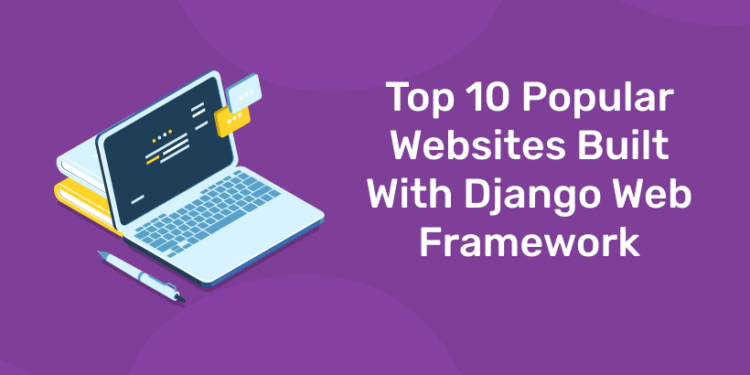Table of Contents
Django, a powerful web framework, underpins numerous popular websites for its robustness and versatility. In this article, we will discuss ‘Top 10 Popular Websites Built With Django Web Framework.’Instagram, one of the most recognized platforms, initially developed its backend using Django. Pinterest relies on Django for sections of its infrastructure, particularly for backend functionalities. Some aspects of YouTube’s content management systems reportedly utilize Django in their architecture. Dropbox uses Django for backend operations, particularly for managing user accounts and authentication. Reddit incorporates parts of its codebase built with Python/Django, among other technologies. Spotify’s backend infrastructure relies on Django for managing user accounts and authentication functionalities.
What is Django?
Django is a high-level, open-source web framework for building robust web applications in Python. Developed to simplify web development by emphasizing the principle of “Don’t Repeat Yourself” (DRY) and rapid development, Django provides a clean and pragmatic design.
Key features of Django include:
Batteries-Included:
Django comes with various components (authentication, URL routing, ORM, templating, etc.) out of the box, reducing the need for external libraries for common web development tasks.
Object-Relational Mapping (ORM):
Django’s ORM allows developers to interact with databases using Python objects, abstracting away low-level SQL queries.
Admin Interface:
It includes a powerful admin panel that enables users to manage site content without writing custom code.
URL Routing:
Django uses a clean and simple URL routing system to map URLs to Python functions (views).
Template Engine:
It offers a templating engine that enables the separation of HTML from Python code, enhancing code readability and maintainability.
Security Features:
Django includes built-in security features like protection against common security threats (SQL injection, cross-site scripting, etc.) and user authentication.
Scalability:
It provides tools and practices to build scalable applications, handling high traffic efficiently.
Community and Documentation:
Django has a strong and active community, offering extensive documentation, tutorials, and third-party packages to extend its functionality.
Overall, Django is well-suited for creating various web applications, ranging from simple blogs and content management systems to complex enterprise-level solutions, thanks to its robustness, scalability, and the ecosystem it offers.
Grab the opportunity to learn Python with Industry Experts! Get a free Demo Here!
Why Django is chosen for Web development?
1: Which of the following data types is immutable in Python?
Django is frequently chosen for web development due to several compelling reasons:
Rapid Development:
Django’s “batteries-included” approach provides pre-built components, allowing developers to build applications swiftly. It follows the “Don’t Repeat Yourself” (DRY) principle, reducing redundancy in code and accelerating development.
Scalability:
Django offers scalability, enabling applications to handle increased traffic and data volume. Its built-in features and best practices facilitate scaling applications efficiently.
Security:
Security is a top priority in Django. It comes with built-in protection against common vulnerabilities like SQL injection, cross-site scripting (XSS), clickjacking, and more. Its ORM protects against many common security mistakes in SQL queries.
Grab the opportunity to learn Python with Industry Experts! Get a free Demo Here!
Community and Ecosystem:
Django boasts a vibrant community that provides extensive documentation, tutorials, and third-party packages (Django Packages) to extend functionality. This ecosystem assists developers in finding solutions and support for various needs.
Versatility:
Django is versatile and adaptable, suitable for a wide range of projects. From small-scale applications like blogs and content management systems to large-scale enterprise-level platforms, Django handles diverse project scopes effectively.
ORM (Object-Relational Mapping):
Django’s ORM simplifies interactions with databases by allowing developers to use Python objects instead of writing SQL queries directly. This abstraction reduces complexity and enhances code readability.
Admin Interface:
Django offers a robust admin interface by default. It allows users to manage site content without requiring developers to build custom admin panels.
Maturity and Stability:
Django is a mature framework with a stable codebase. It has been extensively tested and refined over the years, ensuring reliability and consistency.
In general, Django’s combination of rapid development, security, scalability, extensive community support, and versatility makes it a popular choice for web development, especially when developers seek a powerful and reliable framework to build web applications.
Top 10 Popular Websites Built With Django Web Framework
Here are ten popular websites that were built using the Django web framework:
1. Instagram:
- Instagram, a prominent social media platform, extensively utilized Django for its backend infrastructure.
- Django’s scalability supported Instagram’s rapid growth, handling large volumes of photo uploads and user interactions.
- Its clean design and robustness contributed to Instagram’s stable and efficient backend operations.
2. Pinterest:
- While not entirely Django-dependent, Pinterest incorporates Django for specific backend functionalities.
- Django’s versatility aids in managing aspects of data processing and user interactions within Pinterest’s architecture.
- The framework’s ease of use contributed to streamlined development processes within Pinterest’s ecosystem.
3. YouTube (Parts):
- Certain elements within YouTube’s content management system reportedly rely on Django’s backend capabilities.
- Django’s ORM facilitates database management, helping handle user-generated content and metadata efficiently.
- Its role in YouTube’s architecture focuses on specific backend functionalities rather than the entire platform.
4. Dropbox:
- Django is integrated into Dropbox’s backend, managing user accounts and authentication processes effectively.
- The framework’s rapid development capabilities supported Dropbox in offering a secure and scalable platform.
- Django’s role in Dropbox’s backend highlights its importance in managing user data and authentication.
5. Reddit:
- Reddit incorporates Django in parts of its codebase, though it employs a blend of technologies.
- Django aids Reddit in managing user-generated content, user interactions, and authentication mechanisms.
- The framework contributes to Reddit’s backend, ensuring efficient data handling and user engagement functionalities.
6. Spotify:
- Certain aspects of Spotify’s backend infrastructure rely on Django for managing user accounts and authentication.
- Django’s robustness facilitates handling user authentication and permissions within Spotify’s ecosystem.
- While not the sole framework, Django plays a vital role in specific backend operations of the music streaming platform.
7. Disqus:
- Disqus, a commenting platform, employs Django for backend operations, managing user interactions and comments.
- Django’s ORM aids in handling comment data, user authentication, and managing interactions across various websites.
- The framework ensures Disqus provides a seamless commenting experience across diverse web platforms.
8. Eventbrite:
- Eventbrite, an event management and ticketing platform, relies extensively on Django for its backend operations.
- Django’s versatility supports Eventbrite in managing event listings, user accounts, and event-related data.
- Its scalability contributes to Eventbrite’s ability to handle various events and ticketing functionalities efficiently.
9. The Washington Post (Parts):
- While not entirely Django-based, parts of The Washington Post’s web infrastructure utilize Django.
- Django aids in managing specific backend functionalities, offering a reliable foundation for data management and user engagement.
- Its role in The Washington Post’s architecture demonstrates its contribution to certain backend operations.
10. Booking.com:
- Booking.com utilizes Django for specific backend functionalities within its web architecture.
- Django’s role involves managing aspects of user interactions, authentication, and data management.
- Its use within Booking.com highlights the framework’s adaptability and contribution to specific backend operations.
Limitations of Django
Django is a robust web framework widely acclaimed for its versatility and efficiency in web development. However, it does have some limitations:
Steep Learning Curve:
For beginners or those new to Python, Django’s comprehensive nature might pose a challenge due to its complex architecture and various components.
Monolithic Structure:
Django’s “batteries-included” philosophy means it comes with multiple built-in components. However, this can sometimes lead to unnecessary functionalities for smaller projects, increasing overhead.
Performance for Real-time Applications:
While Django offers scalability, for real-time applications like chat or gaming platforms that require WebSocket connections, Django might not be as efficient as asynchronous frameworks like Node.js.
Flexibility vs. Rigidity:
Django’s ORM and structure, while providing convenience, might be too restrictive for some developers who prefer more flexibility in handling databases and models.
Updates and Versions:
Upgrading between Django versions could potentially break existing code due to significant changes, leading to complexities in maintaining older projects.
Overhead for Simple Projects:
For smaller projects or simple CRUD (Create, Read, Update, Delete) applications, Django’s extensive features might introduce unnecessary complexity and overhead.
Community and Modules:
While Django has a thriving community, the number of available modules and packages might be less compared to other frameworks like Flask, limiting certain functionalities.
Real-time capabilities:
Django is not primarily designed for handling real-time applications, which can be a limitation for specific use cases requiring instant data updates and interactions.
Conclusion
Django powers top websites like Instagram and Pinterest, showcasing its reliability and scalability in diverse applications. Its role in YouTube’s content management and Dropbox’s user authentication highlights its varied backend functionalities. Reddit and Spotify utilize Django, emphasizing its importance in managing user interactions and content. Disqus leverages Django for seamless commenting across platforms, showcasing its versatility in web engagement. Eventbrite and Booking.com’s reliance on Django underlines its adaptability in managing event listings and user interactions.
|
Check These In-Demand Courses |
|
Frequently Asked Questions
Which top websites use Django for their backend?
Examples of top websites which use Django for backend include Instagram, Pinterest, YouTube (parts), Dropbox, Reddit, Spotify, Disqus, Eventbrite, The Washington Post (parts), and Booking.com.
How does Django contribute to the functionality of these websites?
Django often handles backend operations, user authentication, data management, and user interactions, contributing to the site’s stability and efficiency.
Are these websites entirely powered by Django or do they use other technologies too?
Most often, these websites use a mix of technologies and frameworks alongside Django for various functionalities, not relying solely on Django.
Does Django's usage impact the user experience on these websites?
Django’s impact may indirectly affect user experience through efficient backend operations, but direct impact might vary based on specific site features and design.
What specific features of Django are highlighted in these websites?
Django’s ORM, scalability, authentication, and management of user-generated content are typically emphasized in these websites.
Does Django's usage affect the performance of these websites?
Django’s scalability and efficiency contribute positively to the performance, but other factors also influence overall site performance.
Are there any challenges faced while implementing Django in these websites?
Challenges may include managing large volumes of data, scalability issues, adapting to newer Django versions, and integrating with other technologies.
How significant is Django's role in the success of these websites?
Django plays a significant role in managing backend operations, which are crucial for the overall success, but other factors also contribute to site success.
Can knowledge of Django's usage in these websites benefit developers?
Yes, understanding how Django is applied in real-world scenarios provides valuable insights for developers working with Django, aiding in learning best practices and implementation techniques.
Where can one find more information or examples of websites built with Django?
Resources like tech blogs, Django forums, official documentation, and tech news websites often provide insights and examples of websites utilizing Django.











